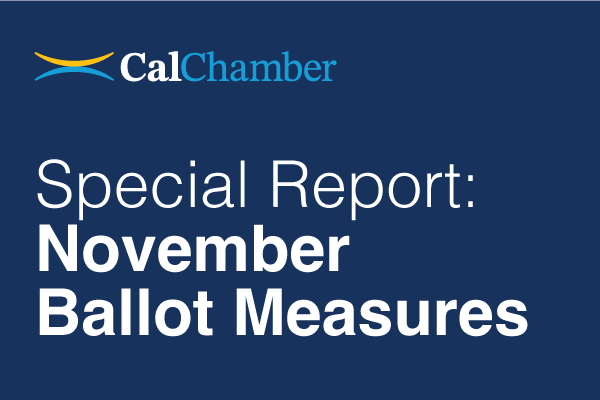
Following are brief summaries of the measures that will appear on the November 5 General Election ballot. When the California Chamber of Commerce has taken a position, the reasons for that position are summarized.
The CalChamber encourages employers to share this information with their employees. Businesses are within their rights to do so — just remember: NO PAYCHECK STUFFERS, no coercion, no rewarding or punishing employees (or threatening to do so) for their political activities or beliefs.
For more guidelines on political communications to employees, see the brochure at www.calchamber.com/guidelines. Note the distinction between internal communications (to employees, stockholders, and their families) and communications to external audiences (such as nonstockholder retirees, outside vendors, customers and passersby).
For more information on the ballot measures, see the links listed below or visit the website of the Secretary of State at www.sos.ca.gov.
Proposition 2
 Authorizes Bonds for Public School and Community College Facilities. Legislative Statute.
Authorizes Bonds for Public School and Community College Facilities. Legislative Statute.
Authorizes $10 billion in general obligation bonds for repair, upgrade and construction of facilities at K–12 public schools (including charter schools), community colleges and career technical education programs, including for improvement of health and safety conditions and classroom upgrades. Requires annual audits.
Placed on Ballot by: Legislature: AB 247 (Muratsuchi; D-Torrance), Chapter 81, Statutes of 2024.
CalChamber Position: Support
Arguments For
Proposition 2 proposes a financing plan that will continue the highly successful School Facility Program, established in 1998 to ensure that the state, school districts and builders in areas of new growth partner to provide the financing needed to construct and improve school facilities throughout the state. Since its inception, this three-way partnership of local school bonds, reasonable developer fees and state funding has provided classroom space for more than a million students and modernized existing facilities for millions more. The measure requires strict taxpayer accountability so funds are spent as promised with local control.
More Information
www.californiansforqualityschools2024.com
Proposition 3
 Constitutional Right to Marriage. Legislative Constitutional Amendment.
Constitutional Right to Marriage. Legislative Constitutional Amendment.
Amends California Constitution to recognize fundamental right to marry, regardless of sex or race. Removes language in California Constitution stating that marriage is only between a man and a woman.
Placed on Ballot by: Legislature: ACA 5 (Low; D-Silicon Valley), Resolution Chapter 125, Statutes of 2023.
CalChamber Position: Support
Arguments For
Fostering an inclusive environment within California companies is good for California. Research demonstrates that diversity and legislation banning discrimination against members of the LGBTQ+ community have positive economic impacts on business: companies in the top quartile of ethnic and cultural diversity measures outperform those in the fourth quartile. Ensuring support and equal protection for members of the LGBTQ+ community is important for employee well-being and fostering inclusive workplaces. Further, a ban on same-sex marriage could hurt business growth and tourism in California. Recent anti-LGBTQ legislation in other states has given companies pause about whether to conduct business within those regions and decreased willingness to host events or conventions.
More Information
YesonProp3CA.com
Proposition 4
 Authorizes Bonds for Safe Drinking Water, Wildfire Prevention, and Protecting Communities and Natural Lands from Climate Risks. Legislative Statute.
Authorizes Bonds for Safe Drinking Water, Wildfire Prevention, and Protecting Communities and Natural Lands from Climate Risks. Legislative Statute.
Authorizes $10 billion in general obligation bonds for water, wildfire prevention, and protection of communities and lands. Requires annual audits.
Placed on Ballot by: Legislature: SB 867 (Allen; D-Santa Monica), Chapter 83, Statutes of 2024.
CalChamber Position: Neutral
Ballot Arguments For
Proposition 4 makes urgent, commonsense investments to protect our communities, health, economy and natural resources. Nearly 1 million Californians lack access to drinking water that meets safety and reliability standards, according to the State Water Board. Proposition 4 will clean up and protect California’s drinking water supplies in all regions of California — remove toxic pollutants from our drinking water, addressing infrastructure risks like weakened dams and levees, and increasing supplies. Recent California wildfires have burned 2 million acres, released toxic smoke into our air and polluted drinking water supplies. Proposition 4 invests in projects to prevent wildfires, reduce their intensity when they do occur, and improve disaster response. Giving firefighters the tools to prevent wildfires is the best, most cost-effective way to prevent the human and financial costs of these disasters. Proposition 4 makes the right investments to save lives and billions in response and recovery costs.
More Information
yesonprop4ca.com
Ballot Arguments Against
Bonds are the most expensive way for government to pay for things. Proposition 4 would add $10 billion of debt to the taxpayers — plus an estimated $9.3 billion in interest — to pay for climate-related programs. This funding would also cover administrative costs and salaries for grant recipients. But remember, this is borrowed money. At the start of the year, California already had more than $78 billion of bond debt. Proposition 1 in March added another $6.38 billion. Now there’s a proposal to add an additional $10 billion for ambiguous climate programs. Bonds should be reserved for financing essential projects that will build infrastructure lasting beyond the 30-year payoff period. Many elements of Proposition 4 fail to meet that standard. It is full of money being funneled to unproven technologies that may sound promising on paper but have no concrete evidence of success. By committing funds to speculative projects, Proposition 4 overlooks long-term water storage and critical wildfire fuel management programs in favor of short-term, unproven projects.
More Information
www.hjta.org/hjta-ballot-measure-recommendations
Proposition 5
 Allows Local Bonds for Affordable Housing and Public Infrastructure with 55% Voter Approval. Legislative Constitutional Amendment.
Allows Local Bonds for Affordable Housing and Public Infrastructure with 55% Voter Approval. Legislative Constitutional Amendment.
Allows approval of local infrastructure and housing bonds for low-and middle-income Californians with 55% vote. Accountability requirements.
Placed on Ballot by: Legislature: ACA 1 (Aguiar-Curry; D-Winters), Resolution Chapter 173, Statutes of 2023; and ACA 10 (Aguiar-Curry; D-Winters), Resolution Chapter 134, Statutes of 2024.
CalChamber Position: Oppose
Arguments Against
Proposition 5 proposes to make it easier for local governments to approve general obligation bonds, increasing property taxes on working class Californians. Local general obligation bonds are repaid through taxes on the assessed value of property, and in some areas of California, local add-on taxes and bond repayments already add thousands of dollars in taxes on top of residents’ annual ad valorem property tax. As of April 2024, the median cost for a single-family home in California was $904,210, according to the California Association of Realtors. For a median-priced home, the base 1% property tax alone costs $753 per month in the first year and increases up to 2% annually. Paving the way for higher housing costs on top of existing taxes will only make the prospect of homeownership further out of reach for the average Californian.
Proposition 5 will directly increase operating costs for small and medium-sized businesses, whether they own or rent their property. Most commercial leases include provisions to increase rent when higher property-related expenses are incurred. Higher property taxes associated with the approval of new general obligation bonds will increase the expenses of small businesses, discouraging entrepreneurs from establishing operations in the state and resulting in fewer employment opportunities for Californians.
The two-thirds vote threshold for approving general obligation bonds has been in place since voters approved the California Constitution in 1879. More than four decades ago, prompted by years of rising taxes, Californians resoundingly approved Proposition 13 to limit ad valorem taxes on property to 1% of the property’s assessed value. Proposition 5 would reduce the vote threshold to approve general obligation bonds and allow taxes used to repay bond debt to exceed the constitutionally established 1% limit, diminishing the people’s voice on tax increases and eroding critical property tax safeguards. Polls have consistently shown that Proposition 13 continues to have a 2-to-1 margin of support from Californians across nearly every major demographic.
More Information
VoteNoProp5.com
Proposition 6
 Eliminates Constitutional Provision Allowing Involuntary Servitude for Incarcerated Persons. Legislative Constitutional Amendment.
Eliminates Constitutional Provision Allowing Involuntary Servitude for Incarcerated Persons. Legislative Constitutional Amendment.
Amends the California Constitution to remove current provision that allows jails and prisons to impose involuntary servitude to punish crime (i.e., forcing incarcerated persons to work).
Placed on Ballot by: Legislature: ACA 8 (Wilson; D-Suisun City), Resolution Chapter 133, Statutes of 2024.
CalChamber Position: No Position (CalChamber Board did not consider this proposal.)
Ballot Arguments For
Proposition 6 eliminates all forms of slavery and involuntary servitude within California, ensuring no person is subjected to such conditions regardless of their confinement circumstances. The measure restores human dignity by ending forced labor, which constitutes slavery and violates human rights. Proposition 6 enhances public safety by prioritizing rehabilitation. The measure expands voluntary prison work programs and ensures dignity, choice, and rehabilitation. Incarcerated individuals will voluntarily take part in education, job training, and other programs that help prevent crimes against Californians. Voluntary work programs reduce recidivism by offering skill development and rehabilitation, aiding formerly incarcerated individuals in reintegrating into society.
More Information
antirecidivism.org
Ballot Arguments Against
No argument was submitted against Proposition 6.
Proposition 32
 Raises Minimum Wage. Initiative Statute.
Raises Minimum Wage. Initiative Statute.
Raises minimum wage as follows: For employers with 26 or more employees, to $17 immediately, $18 on January 1, 2025. For employers with 25 or fewer employees, to $17 on January 1, 2025, $18 on January 1, 2026.
Placed on Ballot by: Petition signatures.
CalChamber Position: Oppose. CalChamber President and CEO Jennifer Barrera co-signed the ballot argument against Proposition 32.
Arguments Against
If Proposition 32 passes, Californians will see higher costs, fewer jobs and a reduction of available work hours for employees in the state. Voters need to reject this proposal because it will contribute to inflation, add to the high cost of living in California, and hurt state revenues. It will put even more pressure on our state budget. Passage of Proposition 32 will leave fewer resources available to fund important programs, including those that enhance public safety and education, and work to combat California’s homelessness crisis. Further, smaller employers, who often are least able to absorb increased costs, will experience a disproportionate impact if the measure passes. Businesses will be saddled with a sustained rise in workforce costs that may be unsustainable.
Proposition 32 hurts workers because it will result in a reduction of jobs and reduced working hours for California employees, disproportionately affecting those with limited training or who are new to the workforce.
Important to employers, the measure will lead to an increase in payroll expenses because employers will be forced to increase wages for many exempt workers. Under California law, to qualify as “exempt,” an employee must make at least twice the minimum wage. Currently, that minimum annual salary with a $16 an hour minimum wage is $66,560. Under an $18 an hour minimum wage, that minimum salary would be $74,880.
More Information
StopProp32.com
Proposition 33
 Expands Local Governments’ Authority to Enact Rent Control on Residential Property. Initiative Statute.
Expands Local Governments’ Authority to Enact Rent Control on Residential Property. Initiative Statute.
Repeals Costa-Hawkins Rental Housing Act of 1995, which currently prohibits local ordinances limiting initial residential rental rates for new tenants or rent increases for existing tenants in certain residential properties.
Placed on Ballot by: Petition signatures.
CalChamber Position: Oppose.
Arguments Against
The ballot measure is unnecessary in the wake of legislation passed in 2019 to cap annual rent increases at 5% plus inflation for tenants (AB 1482; Chiu; D-San Francisco, Chapter 597, Statutes of 2019). AB 1482 requires a landlord to have a just cause, as defined in the law, to evict tenants that had occupied the rental for at least one year. The bill included exemptions for housing built in the past 15 years and some single-family homes and duplexes. AB 1482 was designed to sunset after 10 years.
Restrictive price ceilings reduce the supply of property. When prices are capped, people have less incentive to fix up and rent out their basement flat, or to build rental property. Moreover, reducing vacancy de-control forces landlords to raise rent by the maximum allowable amount.
Rent control will do nothing to increase the supply of affordable housing and likely would discourage new construction, according to a 2016 report from the Legislative Analyst’s Office on California housing. In fact, rent control measures accelerate attrition of the existing stock of rental units in the California marketplace. Studies have shown that local jurisdictions with stringent rent control have lost large numbers of rental units in their markets. Many owners simply convert their housing to another use, including owner-occupied units, vacation rentals, Airbnb, or keep their units off the market altogether.
More Information
NoOnProp33.com
Proposition 34
 Restricts Spending of Prescription Drug Revenues by Certain Health Care Providers. Initiative Statute.
Restricts Spending of Prescription Drug Revenues by Certain Health Care Providers. Initiative Statute.
Requires certain providers to spend 98% of revenues from federal discount prescription drug program on direct patient care. Authorizes statewide negotiation of Medi-Cal drug prices.
Placed on Ballot by: Petition signatures.
CalChamber Position: Support
Arguments For
Proposition 34 will make permanent the Medi-Cal Rx program, which since being established statewide in 2019 has achieved significant cost savings by providing Medi-Cal patients with standardized, low-cost pharmacy benefits. The measure will prevent the worst abusers of the federal drug discount program from misusing money intended to help patients by requiring that at least 98% of revenue be spent on direct patient care. This provision will result in tens of millions of dollars being redirected toward direct patient care for the neediest Californians.
Proposition 34 prohibits these worst offenders from continuing to participate in prescription drug price-gouging schemes that result in big markups of drug prices. Violators that fail to comply with these accountability requirements will lose their state-provided privileges and benefits, including any pharmacy, health care and clinic licenses, and their exemption from state taxation. Violators also will be ineligible for state and local government grants and contracts.
More Information
YesOnProp34.com
Proposition 35
 Provides Permanent Funding for Medi-Cal Health Care Services. Initiative Statute.
Provides Permanent Funding for Medi-Cal Health Care Services. Initiative Statute.
Makes permanent the existing tax on managed health care insurance plans, which, if approved by the federal government, provides revenues to pay for Medi-Cal health care services.
Placed on Ballot by: Petition signatures.
CalChamber Position: Neutral
Ballot Arguments For
More than 15 million Californians rely on Medi-Cal for health insurance coverage, including more than 50% of all children in the state and low-income families, seniors and persons with disabilities. Lack of adequate and ongoing funding means Medi-Cal patients must wait months to see primary care doctors or specialists. Proposition 35 provides dedicated funding to improve the health care system for all without raising taxes on individuals. The measure will provide funding to protect and expand access to care at primary care and specialty care physicians, community health clinics, hospitals, emergency rooms, family planning and mental health providers. Proposition 35 extends an existing levy on health insurance companies that otherwise will expire in 2026. The measure also prevents the state from redirecting the funds for non-health care purposes.
More Information
VoteYes35.com
Ballot Arguments Against
No argument was submitted against Proposition 35.
Proposition 36
 Allows Felony Charges and Increases Sentences for Certain Drug and Theft Crimes. Initiative Statute.
Allows Felony Charges and Increases Sentences for Certain Drug and Theft Crimes. Initiative Statute.
Allows felony charges for possessing certain drugs and for thefts under $950, if defendant has two prior drug or theft convictions.
Place on Ballot by: Petition signatures.
CalChamber Position: Support
Arguments For
Retail theft has been increasing and continuing to harm California businesses and residents. Increasing penalties for these offenses will hold criminals accountable and deter future offenses. Low penalties create little incentive to report, prosecute and punish offenders, meaning that criminals are released back into communities. Heightened penalties will break that cycle.
Fentanyl is now responsible for 20% of youth deaths in California. Defining fentanyl as a hard drug will hold drug dealers accountable and gives judges tools to impose harsher penalties for drug trafficking offenses.
Breaking the cycle of retail theft also requires addressing the causes of theft. Proposition 36 provides mental health and drug treatment services, plus job training for individuals struggling with homelessness, substance abuse or mental illness.
More Information
VoteYesProp36.com
CalChamber Positions on November 2024 Ballot Measures
Proposition 2
K-12 public schools, community college bond
Support
Proposition 3
Constitutional right to marriage
Support
Proposition 4
Safe drinking water, wildfire prevention bond
Neutral
Proposition 5
55% voter approval for local infrastructure/housing bonds
Oppose
Proposition 6
Eliminates constitutional provision allowing involuntary servitude for imprisoned persons
No Position
Proposition 32
Minimum wage increase
Oppose
Proposition 33
Rent control
Oppose
Proposition 34
Restrict spending of prescription drug revenues
Support
Proposition 35
Permanent funding for Medi-Cal health care services
Neutral
Proposition 36
Increases penalties for drug and theft crimes
Support

